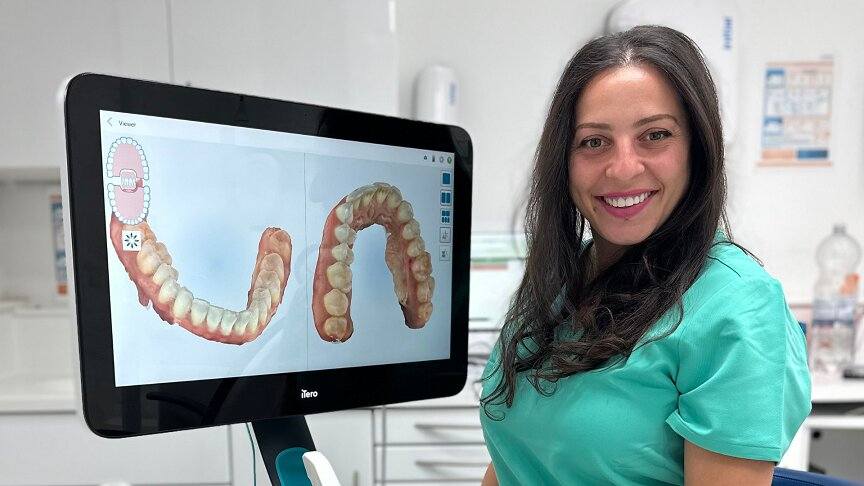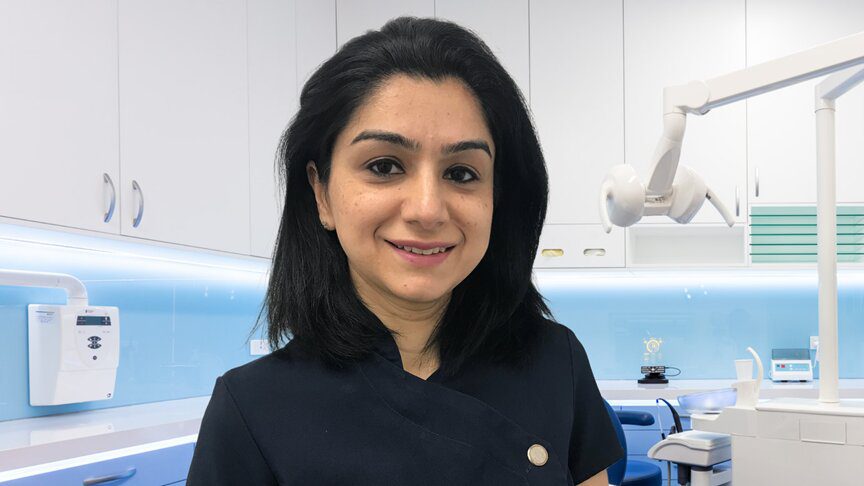Bad breath — also known as halitosis — is one of the most common yet often overlooked oral health concerns. It can affect your confidence, impact relationships, and even signal an underlying dental issue. The good news? Bad breath is almost always treatable with the right diagnosis and care.
At Whites Dental, our experienced dentists in Waterloo (SE1) and Marble Arch (W2) help patients identify the causes of bad breath and provide tailored, lasting treatments for bad breath.
In this detailed guide, we’ll cover:
- What causes bad breath
- How to know if you have halitosis.
- Proven treatments and prevention tips
- Lifestyle habits that help maintain fresh breath
- How Whites Dental can help you get rid of bad breath for good
What Is Bad Breath (Halitosis)?
Halitosis refers to persistent unpleasant odours from the mouth, typically caused by bacteria, food debris, or infection. While temporary bad breath after eating or drinking strong-smelling foods is normal, chronic halitosis suggests a deeper oral health problem — one that needs professional attention.
Common Causes Of Bad Breath
Understanding the source of halitosis or bad breath is key to effective treatment.
1. Poor Oral Hygiene
When brushing and flossing aren’t thorough, bacteria break down food particles and release foul-smelling sulphur compounds.
2. Gum Disease (Periodontitis)
Inflamed, infected gums release toxins and gases that cause persistent odour.
3. Infection In The Mouth
Abscesses, untreated cavities, or infected gums produce pus and bacteria that emit strong odours. Dental infections often cause pain and a sour or metallic taste.
4. Tongue Coating
Bacteria, food debris, and dead cells accumulate on the tongue’s surface. This biofilm is one of the most frequent causes of bad breath.
5. Food And Drink
Garlic, onions, coffee and alcohol contain compounds that enter your bloodstream and are exhaled through your lungs.
6. Smoking And Tobacco Use
Nicotine dries out the mouth and leaves a lingering odour, while also increasing your risk of gum disease.
7. Dry Mouth (Xerostomia)
A lack of saliva prevents natural cleansing of bacteria, creating an environment where odours thrive.
8. Medical Conditions
Sinus infections, diabetes, tonsil stones and acid reflux can all contribute to halitosis.
How To Tell If You Have Bad Breath

Many people don’t realise they have bad breath until someone tells them. Look out for these warning signs:
- A coated or discoloured tongue.
- Persistent dry mouth
- A bad taste even after brushing
- People stepping back during conversation
💡 Self-check tip: Lick your wrist, let it dry and smell it — an unpleasant odour often indicates halitosis.
How To Get Rid Of Bad Breath For Good
Here’s how to achieve long-lasting freshness:
Step 1: Perfect Your Oral Hygiene Routine
Brush twice a day for at least two minutes, floss daily and clean your tongue using a scraper.
Step 2: Visit Your Dentist Regularly
Routine check-ups remove hidden plaque and detect decay or gum disease before it worsens.
Step 3: Stay Hydrated
Drink lots of water and also chew a gum (preferably one that’s sugar-free) to help stimulate flow of saliva.
Step 4: Quit Smoking
Eliminating tobacco improves both breath and gum health.
Step 5: Treat Underlying Oral Conditions
Professional care is essential if bad breath comes from infections, gum disease or tooth decay.
When To See A Dentist For Bad Breath
If your breath still smells after improving oral care for two weeks, you should go to a dentist clinic for bad breath treatment. You should also seek help if you experience:
- Bleeding gums or gum tenderness
- A constant bad taste
- Tooth sensitivity or visible decay
- White coating on the tongue
- Persistent dry mouth.
At Whites Dental, we’ll assess your oral health, identify the source, and design a tailored halitosis treatment plan.
Bad Breath Treatment At Whites Dental
At our Waterloo (SE1) and Marble Arch (W2) clinics, we offer evidence-based treatments for halitosis.
1. Dental Hygiene And Deep Cleaning
Our hygienists perform deep scale and polish treatments to remove plaque, tartar, and bacteria that brushing can’t reach.
2. Gum Disease Treatment
For advanced gum infections, we offer periodontal therapy to restore gum health and eliminate odour-causing bacteria.
3. Tooth Decay Repair
Filling or restoring decayed teeth removes infection and prevents bacterial buildup.
4. Tongue Cleaning & Bacterial Balance
We’ll demonstrate how to clean your tongue effectively and may recommend antibacterial mouth rinses.
5. Saliva Management & Dry Mouth Solutions
We can prescribe professional rinses or saliva substitutes to relieve dryness and prevent bacterial growth.
Lifestyle And Dietary Changes To Prevent Bad Breath
Beyond dental treatment, your lifestyle and diet play a crucial role in maintaining fresh breath.
1. Eat A Balanced Diet
Nutrient-rich foods — especially fibrous fruits and vegetables — help cleanse your teeth naturally and stimulate saliva. Avoid excessive sugar, which feeds harmful bacteria.
2. Limit Alcohol And Coffee
Both dehydrate your mouth and promote bacterial growth. Swap coffee for green tea and alcohol for water or herbal tea.
3. Stay Hydrated
Dry mouth is one of the most common contributors to bad breath. Keep a water bottle handy and sip throughout the day.
4. Manage Stress
Chronic stress can reduce saliva flow. Relaxation techniques like meditation and yoga help your body maintain moisture balance.
5. Get Enough Sleep
Mouth breathing at night increases dryness. A healthy sleep routine keeps your body and mouth in balance.
Adopting these changes, along with professional care, will help you maintain long-lasting oral freshness.
Bad Breath Treatment At Whites Dental
Whites Dental Waterloo
📍 172 Blackfriars Rd, London SE1 8ER
📞 020 8616 0590
Whites Dental Marble Arch (W2)
📍 52B Kendal St, St George’s Fields, London W2 2BP
📞 020 3576 2325
Both clinics offer professional halitosis assessment and tailored treatment options using advanced hygiene technology.
Frequently Asked Questions
1. Can bad breath be cured permanently?
Yes — once the root cause is identified and treated, most people experience lasting improvement.
2. Does mouthwash fix bad breath?
It can mask odour temporarily, but it doesn’t treat underlying causes like infection or gum disease.
3. Is dry mouth a major cause?
Absolutely. Saliva is essential for neutralising bacteria, so dry mouth often leads to persistent odour.
4. Can diet affect my breath?
Yes — strong foods, sugar, and alcohol can all worsen bad breath.
5. How much does bad breath treatment cost in London?
At Whites Dental, hygiene treatments start from £95, with tailored plans for gum therapy or decay repair.
Final Thoughts
Bad breath can be distressing, but it’s almost always treatable. By improving oral hygiene, making small lifestyle changes, and visiting your dentist regularly, you can enjoy fresh, confident breath every day.
At Whites Dental in Waterloo and Marble Arch, our experienced team can diagnose the cause of halitosis and provide lasting treatment.
👉 Book your Bad Breath Treatment in London today and take the first step towards fresher breath and better oral health.
